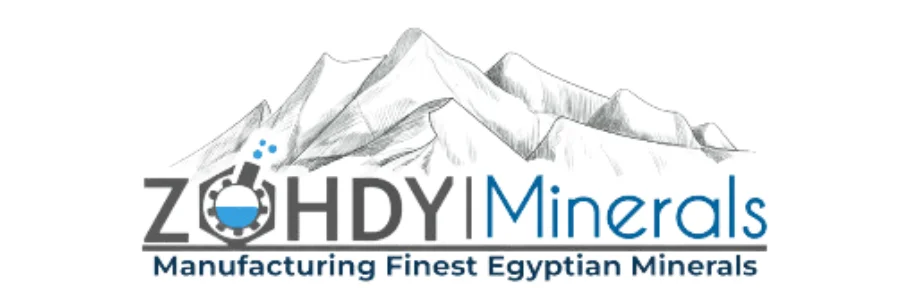Calcium carbonate in the plastics and rubber industries in Saudi Arabia is a widely used additive that helps improve the properties of both plastics and rubber. Its applications are diverse, enhancing the strength and durability of rubber and plastic products. Moreover, calcium carbonate acts as a cost-effective filler, reducing overall production costs. In addition, it improves moldability and processing efficiency.
In Saudi Arabia, calcium carbonate is used in a wide range of plastic and rubber applications such as automotive parts and household products. As a vital material, it contributes to higher performance and sustainability of rubber and plastic products. If you are looking to source calcium carbonate for plastics and rubber applications in Saudi Arabia, For high-quality Calcium Carbonate in Saudi Arabia, Zohdy Minerals Egypt is your trusted partner, Contact us.
- Calcium Carbonate in Plastics in Saudi Arabia
Calcium carbonate serves as a kind of skeleton structure in plastic products, significantly improving dimensional stability. It also enhances product rigidity, electrical performance, flame resistance, heat resistance, and processing efficiency. Furthermore, calcium carbonate improves gloss and surface uniformity, especially with Zohdy Minerals Egypt’s high-quality supply in Saudi Arabia.
When added, it increases heat resistance in standard plastic products. With a whiteness degree exceeding 90%, calcium carbonate can act as a cost-effective substitute for expensive white pigments.
For example, in PVC manufacturing:
- Proper use of heavy calcium carbonate improves heat resistance, rigidity, dimensional stability, and processability.
- Small amounts of light calcium carbonate help increase tensile strength in PVC products.
However, caution is needed:
- Excessive amounts of calcium carbonate in PVC may lead to quality degradation.
- Using low-quality calcium carbonate significantly reduces the final product’s performance.
- The same dosage of standard, high-quality, or poor-quality calcium carbonate leads to very different outcomes in product performance.
Calcium carbonate plays a dual role in the rubber industry: as a reinforcing agent and as a cost-effective filler.
- Enhanced flexibility and strength: It increases elasticity and abrasion resistance in rubber products, making it ideal for applications such as tires, belts, and gaskets.
- Volume without weight: It adds bulk to rubber compounds without significantly increasing weight, resulting in lighter yet stronger products.
- Improved processability: Thanks to its fine particle size, it disperses evenly within the rubber matrix, improving uniformity and ease of processing.
- Reduced overall costs: By lowering the consumption of expensive rubber polymers, it reduces production costs and increases profitability.
Key Roles of Calcium Carbonate (CaCO₃) in Rubber Manufacturing
- Lowering melting point in mixtures
- The main component of glass is silica (SiO₂), which melts at very high temperatures (1700°C).
- When calcium carbonate is added to silica, a raw glass mixture forms.
- At high temperatures, CaCO₃ reacts with silica to produce compounds with much lower melting points (800–900°C).
- This enables more efficient glass manufacturing with reduced energy consumption.
- Improving rubber properties
- Strength: Enhances abrasion resistance.
- Hardness: Makes rubber more rigid and durable.
- Chemical resistance: Increases resistance to chemicals.
- Heat resistance: Improves ability to withstand high temperatures.
- Facilitating processing
- Reduces rubber viscosity, making mixing and shaping easier.
- Shortens mixing time, increasing production efficiency.
- Enhances moldability for diverse rubber products.
- Types of calcium carbonate used in rubber
- Heavy calcium carbonate: For products requiring strength and rigidity, such as footwear.
- Light calcium carbonate: For highly flexible products like tires.
- Usage levels
- The ratio varies depending on the product.
- Typically ranges from 10% to 50%.
- Impact on rubber properties
- Hardness: Increases rigidity and scratch/abrasion resistance.
- Heat resistance: Improves performance at high temperatures.
- Tensile strength: Enhances load-bearing capacity.
- Fatigue resistance: Reduces fatigue rate, extending product lifespan.
- Chemical resistance: Improves resistance to acids and bases.
- Applications in the rubber industry
- Tires: To boost strength and abrasion resistance.
- Footwear: For increased rigidity and durability.
- Other products: Hoses, gaskets, and rubber sheets.
- Environmental impact
- Calcium carbonate is natural and non-toxic, making it relatively safe for the environment.
- Rarely causes pollution when disposed of properly.
- Alternatives to calcium carbonate in rubber
- Silica: For enhanced strength and abrasion resistance.
- Clay: For improved flexibility and moldability.
The use of calcium carbonate in plastics and rubber industries continues to grow steadily due to its wide-ranging benefits from improving product quality to lowering manufacturing costs. Its versatility and efficiency make calcium carbonate indispensable in both sectors. Whether producing plastic packaging or industrial rubber components, calcium carbonate plays a vital role in boosting performance and cost savings.
For high-quality Calcium Carbonate in Saudi Arabia, Zohdy Minerals Egypt is your trusted partner, Contact us.






